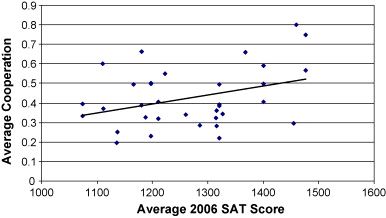söndag
okt192008
Duktiga elever bättre på samarbete?
 19 okt 2008, kl 15:22
19 okt 2008, kl 15:22
En artikel jag redan skrivit om här är nu på väg ut i Journal of Economic Behavior and Organization: Garret Jones samlade in resultaten från experiment med upprepade fångarnas dilemma vid olika universitet och fann följande intressanta samband:
Källa: Jones, G. 2008. Are smarter groups more cooperative? Evidence from prisoner's dilemma experiments, 1959–2003. Forthcoming in JEBO. Länk (endast för Lundafolk.)
Graden av samarbete och snittresultat i det amerikanska SAT är robust positivt korrelerad:
students at schools with higher average SAT and ACT scores cooperatemuch more often, yielding about 5% more cooperation for every 100combined SAT points [...] Students at the best schools cooperate about 15% more often than typical college students.Metastudier kan ofta vara ett smart sätt att få ny kunskap. Jones behövde inte göra några egna experiment, bara kolla var andra var gjorda och vilket SAT-snitt skolan i fråga hade.
Källa: Jones, G. 2008. Are smarter groups more cooperative? Evidence from prisoner's dilemma experiments, 1959–2003. Forthcoming in JEBO. Länk (endast för Lundafolk.)


Reader Comments (2)
A new experimental study by Rustichini et al. confirms that high-IQ people cooperate more often in a repeated prisoner's dilemma. They show that smarter people are more likely to "play nice" at the beginning. Their test subjects are 1,000 truck drivers, who are mostly from the same background.
The link to the new paper is in the URL link.